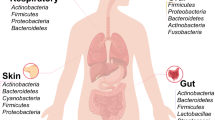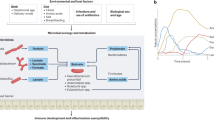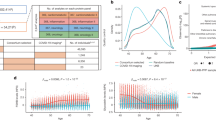Abstract
Anti-tumour necrosis factor-α (TNF-α) is used for treatment of severe cases of inflammatory bowel diseases (IBD), including Crohn’s disease (CD) and ulcerative colitis (UC). However, one-third of the patients do not respond to the treatment. A recent study indicated that genetically determined high activity of pro-inflammatory cytokines, including interleukin-1β (IL-1β), IL-6 and interferon gamma (IFN-γ), are associated with non-response to anti-TNF therapy. Using a candidate gene approach, 21 functional single-nucleotide polymorphisms (SNPs) in 14 genes in the Toll-like receptors, the inflammasome and the IFNG pathways were assessed in 482 and 256 prior anti-TNF naïve Danish patients with CD and UC, respectively. The results were analysed using logistic regression (adjusted for age and gender). Eight functional SNPs were associated with anti-TNF response either among patients with CD (TLR5 (rs5744174) and IFNGR2 (rs8126756)), UC (IL12B (rs3212217), IL18 (rs1946518), IFNGR1 (rs2234711), TBX21 (rs17250932) and JAK2 (rs12343867)) or in the combined cohort of patient with CD and UC (IBD) (NLRP3 (rs10754558), IL12B (rs3212217) and IFNGR1 (rs2234711)) (P<0.05). Only the association with heterozygous genotype of IL12B (rs3212217) (OR: 0.24, 95% CI: 0.11–0.53, P=0.008) among patients with UC withstood Bonferroni correction for multiple testing. In conclusion, Our results suggest that SNPs associated with genetically determined high activity of TLR5 among patients with CD and genetically determined high IL-12 and IL-18 levels among patients with UC were associated with non-response. Further studies will evaluate whether these genes may help stratifying patients according to the expected response to anti-TNF treatment.
This is a preview of subscription content, access via your institution
Access options
Subscribe to this journal
Receive 6 print issues and online access
$259.00 per year
only $43.17 per issue
Buy this article
- Purchase on Springer Link
- Instant access to full article PDF
Prices may be subject to local taxes which are calculated during checkout

Similar content being viewed by others
References
Podolsky DK . Inflammatory bowel disease. N Engl J Med 2002; 347: 417–429.
Knight DM, Trinh H, Le J, Siegel S, Shealy D, McDonough M et al. Construction and initial characterization of a mouse-human chimeric anti-TNF antibody. Mol Immunol 1993; 30: 1443–1453.
Siegel SA, Shealy DJ, Nakada MT, Le J, Woulfe DS, Probert L et al. The mouse/human chimeric monoclonal antibody cA2 neutralizes TNF in vitro and protects transgenic mice from cachexia and TNF lethality in vivo. Cytokine 1995; 7: 15–25.
Scallon BJ, Moore MA, Trinh H, Knight DM, Ghrayeb J . Chimeric anti-TNF-alpha monoclonal antibody cA2 binds recombinant transmembrane TNF-alpha and activates immune effector functions. Cytokine 1995; 7: 251–259.
ten HT, van MC, Peppelenbosch MP, van Deventer SJ . Infliximab treatment induces apoptosis of lamina propria T lymphocytes in Crohn's disease. Gut 2002; 50: 206–211.
Rutgeerts P, Sandborn WJ, Feagan BG, Reinisch W, Olson A, Johanns J et al. Infliximab for induction and maintenance therapy for ulcerative colitis. N Engl J Med 2005; 353: 2462–2476.
Mascheretti S, Hampe J, Kuhbacher T, Herfarth H, Krawczak M, Folsch UR et al. Pharmacogenetic investigation of the TNF/TNF-receptor system in patients with chronic active Crohn's disease treated with infliximab. Pharmacogenomics J 2002; 2: 127–136.
Paramel GV, Folkersen L, Strawbridge RJ, Elmabsout AA, Sarndahl E, Lundman P et al. CARD8 gene encoding a protein of innate immunity is expressed in human atherosclerosis and associated with markers of inflammation. Clin Sci (Lond) 2013; 125: 401–407.
Strowig T, Henao-Mejia J, Elinav E, Flavell R . Inflammasomes in health and disease. Nature 2012; 481: 278–286.
Chang HD, Radbruch A . The pro- and anti-inflammatory potential of interleukin-12. Ann NY Acad Sci 2007; 1109: 40–46.
Schroder K, Hertzog PJ, Ravasi T, Hume DA . Interferon-gamma: an overview of signals, mechanisms and functions. J Leukoc Biol 2004; 75: 163–189.
D'Osualdo A, Reed JC . NLRP1, a regulator of innate immunity associated with vitiligo. Pigment Cell Melanoma Res 2012; 25: 5–8.
Sagulenko V, Thygesen SJ, Sester DP, Idris A, Cridland JA, Vajjhala PR et al. AIM2 and NLRP3 inflammasomes activate both apoptotic and pyroptotic death pathways via ASC. Cell Death Differ 2013; 20: 1149–1160.
Hong GS, Jung YK . Caspase recruitment domain (CARD) as a bi-functional switch of caspase regulation and NF-kappaB signals. J Biochem Mol Biol 2002; 35: 19–23.
Bank S, Andersen PS, Burisch J, Pedersen N, Roug S, Galsgaard J et al. Associations between functional polymorphisms in the NFkappaB signaling pathway and response to anti-TNF treatment in Danish patients with inflammatory bowel disease. Pharmacogenomics J 2014; 14: 526–34.
Bank S, Skytt AP, Burisch J, Pedersen N, Roug S, Galsgaard J et al. Polymorphisms in the inflammatory pathway genes TLR2, TLR4, TLR9, LY96, NFKBIA, NFKB1, TNFA, TNFRSF1A, IL6R, IL10, IL23R, PTPN22, and PPARG are associated with susceptibility of inflammatory bowel disease in a Danish cohort. PLoS One 2014; 9: e98815.
Sode J, Vogel U, Bank S, Andersen PS, Thomsen MK, Hetland ML et al. Anti-TNF treatment response in rheumatoid arthritis patients is associated with genetic variation in the NLRP3-inflammasome. PLoS One 2014; 9: e100361.
Bank S, Andersen PS, Burisch J, Pedersen N, Roug S, Galsgaard J et al. Effectiveness of anti-tumour necrosis factor-alpha therapy in Danish patients with inflammatory bowel diseases. Dan Med J 2015; 62: A4994.
Bank S . A cohort of anti-TNF treated Danish patients with inflammatory bowel disease, used for identifying genetic markers associated with treatment response. Dan Med J 2015; 62: B5087.
Ljung T, Karlen P, Schmidt D, Hellstrom PM, Lapidus A, Janczewska I et al. Infliximab in inflammatory bowel disease: clinical outcome in a population based cohort from Stockholm County. Gut 2004; 53: 849–853.
Caspersen S, Elkjaer M, Riis L, Pedersen N, Mortensen C, Jess T et al. Infliximab for inflammatory bowel disease in Denmark 1999-2005: clinical outcome and follow-up evaluation of malignancy and mortality. Clin Gastroenterol Hepatol 2008; 6: 1212–1217.
Cohen RD, Tsang JF, Hanauer SB . Infliximab in Crohn's disease: first anniversary clinical experience. Am J Gastroenterol 2000; 95: 3469–3477.
Bank S, Nexo BA, Andersen V, Vogel U, Andersen PS . High-quality and -quantity DNA extraction from frozen archival blood clots for genotyping of single-nucleotide polymorphisms. Genet Test Mol Biomarkers 2013; 17: 501–503.
Dhiman N, Ovsyannikova IG, Vierkant RA, Ryan JE, Pankratz VS, Jacobson RM et al. Associations between SNPs in toll-like receptors and related intracellular signaling molecules and immune responses to measles vaccine: preliminary results. Vaccine 2008; 26: 1731–1736.
Sheridan J, Mack DR, Amre DK, Israel DM, Cherkasov A, Li H et al. A non-synonymous coding variant (L616F) in the TLR5 gene is potentially associated with Crohn's disease and influences responses to bacterial flagellin. PLoS One 2013; 8: e61326.
Klimosch SN, Forsti A, Eckert J, Knezevic J, Bevier M, Schonfels V et al. Functional TLR5 genetic variants affect human colorectal cancer survival. Cancer Res 2013; 73: 7232–7242.
Hijikata M, Shojima J, Matsushita I, Tokunaga K, Ohashi J, Hang NT et al. Association of IFNGR2 gene polymorphisms with pulmonary tuberculosis among the Vietnamese. Hum Genet 2012; 131: 675–682.
Wu JF, Wu TC, Chen CH, Ni YH, Chen HL, Hsu HY et al. Serum levels of interleukin-10 and interleukin-12 predict early, spontaneous hepatitis B virus e antigen seroconversion. Gastroenterology 2010; 138: 165–172.
Jaiswal PK, Singh V, Srivastava P, Mittal RD . Association of IL-12, IL-18 variants and serum IL-18 with bladder cancer susceptibility in North Indian population. Gene 2013; 519: 128–134.
Dziedziejko V, Kurzawski M, Paczkowska E, Machalinski B, Pawlik A . The impact of IL18 gene polymorphisms on mRNA levels and interleukin-18 release by peripheral blood mononuclear cells. Postepy Hig Med Dosw (Online) 2012; 66: 409–414.
Hitomi Y, Ebisawa M, Tomikawa M, Imai T, Komata T, Hirota T et al. Associations of functional NLRP3 polymorphisms with susceptibility to food-induced anaphylaxis and aspirin-induced asthma. J Allergy Clin Immunol 2009; 124: 779–785.
Lugering A, Schmidt M, Lugering N, Pauels HG, Domschke W, Kucharzik T . Infliximab induces apoptosis in monocytes from patients with chronic active Crohn's disease by using a caspase-dependent pathway. Gastroenterology 2001; 121: 1145–1157.
Di SA, Ciccocioppo R, Cinque B, Millimaggi D, Morera R, Ricevuti L et al. Defective mucosal T cell death is sustainably reverted by infliximab in a caspase dependent pathway in Crohn's disease. Gut 2004; 53: 70–77.
Siegel CA, Melmed GY . Predicting response to anti-TNF agents for the treatment of Crohn's disease. Therap Adv Gastroenterol 2009; 2: 245–251.
Hlavaty T, Pierik M, Henckaerts L, Ferrante M, Joossens S, van SN et al. Polymorphisms in apoptosis genes predict response to infliximab therapy in luminal and fistulizing Crohn's disease. Aliment Pharmacol Ther 2005; 22: 613–626.
Pierik M, Vermeire S, Steen KV, Joossens S, Claessens G, Vlietinck R et al. Tumour necrosis factor-alpha receptor 1 and 2 polymorphisms in inflammatory bowel disease and their association with response to infliximab. Aliment Pharmacol Ther 2004; 20: 303–310.
Bek S, Nielsen JV, Bojesen AB, Franke A, Bank S, Vogel U et al. Systematic review: genetic biomarkers associated with anti-TNF treatment response in inflammatory bowel diseases. Aliment Pharmacol Ther 2016; 44: 554–67.
Bank S . A cohort of anti-TNF treated Danish patients with inflammatory bowel disease, used for identifying genetic markers associated with treatment response. Dan Med J 2015; 62: B5087.
Murdaca G, Spanò F, Contatore M, Guastalla A, Magnani O, Puppo F . Pharmacogenetics of etanercept: role of TNF-α gene polymorphisms in improving its efficacy. Expert Opin Drug Metab Toxicol 2014; 10: 1703–1710.
Acknowledgements
The work was funded by Health Research Fund of Central Denmark Region, Colitis-Crohn Foreningen and University of Aarhus (PhD grant).
Author information
Authors and Affiliations
Corresponding author
Ethics declarations
Competing interests
The authors declare no conflict of interest.
Additional information
Supplementary Information accompanies the paper on the The Pharmacogenomics Journal website
Supplementary information
PowerPoint slides
Rights and permissions
About this article
Cite this article
Bank, S., Andersen, P., Burisch, J. et al. Genetically determined high activity of IL-12 and IL-18 in ulcerative colitis and TLR5 in Crohns disease were associated with non-response to anti-TNF therapy. Pharmacogenomics J 18, 87–97 (2018). https://doi.org/10.1038/tpj.2016.84
Received:
Revised:
Accepted:
Published:
Issue Date:
DOI: https://doi.org/10.1038/tpj.2016.84
This article is cited by
-
Predictive biomarkers for anti-TNF alpha therapy in IBD patients
Journal of Translational Medicine (2024)
-
Spondyloarthritis with inflammatory bowel disease: the latest on biologic and targeted therapies
Nature Reviews Rheumatology (2023)
-
The enteric nervous system in gastrointestinal disease etiology
Cellular and Molecular Life Sciences (2021)
-
NFKB2 polymorphisms associate with the risk of developing rheumatoid arthritis and response to TNF inhibitors: Results from the REPAIR consortium
Scientific Reports (2020)
-
Targeting NLRP3 Inflammasome in Inflammatory Bowel Disease: Putting out the Fire of Inflammation
Inflammation (2019)



